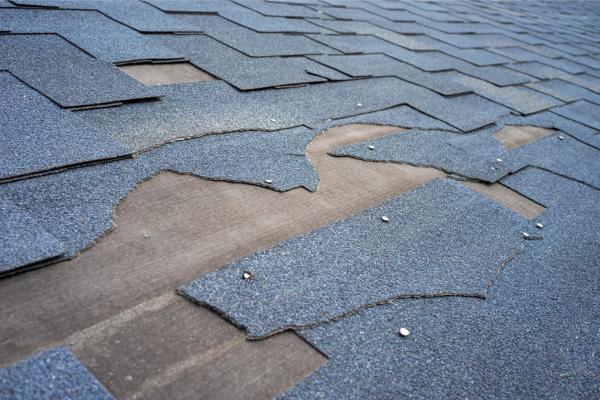We decided to write this blog because customers are constantly asking us: “How often will insurance pay for a new roof?” We know you want to know, and to keep our team wide open for renovations, we’re providing this information up-front.
Whether you’re biting your nails over having enough coverage or how to compile evidence, we’ll show you how a professional roofing contractor can help.
How Often Will Insurance Pay for a New Roof?
Most insurance companies are no strangers to storm damage claims for roofs. While not all policies include roof protection, most do. Note your policy as well as the type of insurance you have. Generally, you’ll need homeowner’s insurance to pay for this type of damage.
Insurers will almost always pay for damage, no matter what. Let’s say your home weathers a hailstorm in April that tears up the roof, and this damage earns coverage. If another bad storm in May tears up your roof further, your insurer would pay for that, too. That’s the degree to which most insurance companies keep their word.
Insurers essentially gamble against the weather. In the best-case scenario, customers pay for insurance without ever needing compensation. The more people don’t file claims, the more money an insurance company makes.
Is There a Limit to How Many Claims I Can Make?
Though insurance companies keep their word in the event of genuine, unpredictable damage, you shouldn’t file a claim whenever the wind blows. For customers, fewer claims look a lot better to insurers than a lot of claims, but legitimate claims are always mandatory.
Four $500 claims over trivialities is much worse than one $500 claim for genuine damage. In fact, if you’re a squeaky enough wheel, your insurance company might abandon you completely and cut you off from service.
When you buy insurance, you pay for a promise. If anything bad happens, the insurer has your back.
What Evidence Do I Need?
First and foremost, if your roof has sustained no damage at the time you read this, take “Before” pics. These will be invaluable if your roof ever receives damage.
If your roof has already sustained damage, time stamps on “After” pics are the next best thing because they coincide with the storm. Roofing contractors can help with all forms of documentation and evidence. An experienced roofing company’s professional assessment of your damage is the best piece of evidence you can give to an insurance company.
Ultimately, all the evidence you acquire must make sense because the burden of proof is on the policy holder. No insurance company is going to call you after a hailstorm to make sure you’re okay. You’re not dealing with a doting high school teacher. You’re dealing with a college professor who expects you to take initiative!
Can My Roof’s Age Impact Coverage?
For most policies, a roof’s age impacts how much money an insurer owes. Under ten years old, a roof enjoys full coverage. Any older, and its value slowly depreciates in the eyes of an insurer, but a little money is better than none at all. The insurance company’s job, of course, is to put you in the position you were in before you lost your property: no better, no worse.
A roof that’s existed for 20 years may receive no coverage at all, as such roofs are due for replacement, anyway. Insurers can point to general wear and tear as the culprit if a roof is old enough, and they may deny coverage based on this assumption.
If your roof suffers from normal wear and tear, you may benefit from re-roofing, which is when a contractor places a fresh layer of shingles across a roof in the interest of fixing minor leaks.

Reroofing can address regular wear and tear.
How Can Roofing Contractors Help Me Negotiate with Insurance?
A roofing contractor can help you compile all relevant details. You’ll need to provide weather data, type of shingles, type of siding, type of roof, age of material, before-and-after pics and method of repair. Each of these items will have to reach your insurer.
Professional roofing contractors are often good resources for gathering evidence most effectively. The more evidence you find with a contractor’s help, the more money you’re likely to earn. Check all areas, apart from the roof, that the storm may have affected.
When you’re ready to swing the sword, you’ll also need a roofing contractor’s help to ballpark an estimate for damage costs. A range will help the insurer compare prices. Once the insurer accepts your claim, you can officially sign a roofing contract with your company of choice for enduring repairs.
How Much Does Insurance Go Up after New Roof Installation?
An individual’s insurance doesn’t increase unless the individual is at-fault. Catastrophic weather is much different from flooding your house by leaving a faucet on.
There may also be a general increase among customers in a certain disaster-prone location, like Tornado Alley. If you live in such a place, you’re essentially helping to pay for neighbors’ repairs, so ensuring your claim is valid is the bottom line.
What Insurance Covers Roof Replacement?
In the event of storms, homeowner’s insurance covers roof replacement almost always, but all customers should review policies at least once a year. Insurance companies often amend policies without notifying you, and the changes take effect if you don’t respond. One of our customers didn’t know her coverage had been cut in half until a tree had fallen on her house.
In spite of high regulation, insurance is a for-profit business. An insurer’s primary goal is to make money, not to help people, though the best companies often achieve both.

Once you earn coverage, the finished product will look like this!
As a Chicagoland Resident, Whom Should I Contact?
Across all providers, homeowner’s insurance is constantly evolving and changing. The landscape just won’t be the same ten years from now.
Learn how to keep yourself protected. Make use of any available information. Consult professional contractors and public adjusters, alike.
As always, you can speak with an agent at Renowned Building Solutions. Consult the experts! We have years of experience wrangling with public adjusters and presenting evidence that earns the most possible coverage. You can also email us or fill our online form to schedule a consultation.






